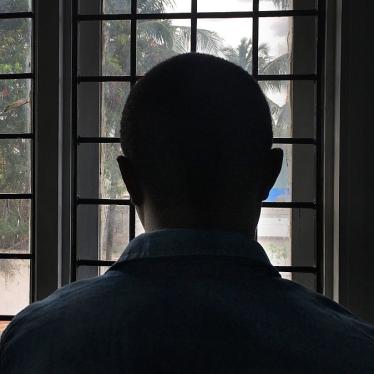On behalf of Human Rights Watch, I write to express our deep concern over the recent arrests and charges filed against Onziema Patience, Valentine Kalende, and Usaam Mukwaaya—three human rights activists—supporting the rights of lesbian, gay, bisexual, and transgender (LGBT) communities in Uganda during a peaceful demonstration in Kampala. We urge you to ensure that the charges against are dropped. In addition, prohibiting such a demonstration and arresting its participants amounts to an unacceptable and discriminatory interference with the peaceful exercise of the freedoms of expression and assembly.
On June 3, 2008, national police in Kampala arrested the three activists during a peaceful protest organized by local LGBT organizations. Demonstrators carried signs demanding attention to HIV/AIDS vulnerability among members of the LGBT community. The demonstration came in response to a statement by the Chairman of the Uganda AIDS Commission, Kihumuro Apuuli. On June 2, during the HIV/AIDS Implementers Meeting in Kampala, he declared that “gays are one of the drivers of HIV in Uganda, but because of meager resources we cannot direct our programmes at them at this time.”
Police took the three activists to the Jinja Road Police Station and held them until June 6. Authorities finally released the activists on bail after charging them with criminal trespass, under Section 302 of the Uganda Penal Code. The day of their release, cosponsors of the Implementers Meeting provided the activists with appropriate accreditation to the conference. Despite this, police detained one of the activists for over four hours, then charged him with “forgery of documents.” All three are now facing a court hearing on June 20, 2008.
These arrests, together with the statement by the Chair of the AIDS Commission, clearly signify the obstacles that communities fighting for prevention and care of HIV/AIDS face in Uganda. The arrests are another example of the long history of threats by government officials in Uganda—and of rights abuses following such threats.
For example, on July 6, 2005, a writer in the government-owned New Vision newspaper urged authorities to crack down on homosexuality, writing, “The police should visit the holes mentioned in the press, spy on the perverts, arrest and prosecute them. Relevant government departments must outlaw or restrict websites, magazines, newspapers and television channels promoting immorality – including homosexuality, lesbianism, pornography, etc.” Later that month, local government officers raided the home of Victor Mukasa, a lesbian activist and Chairperson of Sexual Minorities Uganda. They seized documents and other materials, and arrested another lesbian activist and held her overnight.
In September 1999, after (inaccurate) published reports of a wedding ceremony between two men in Uganda, you stated that, "I have told the CID [Criminal Investigations Department] to look for homosexuals, lock them up and charge them." Allegedly, police arrested and tortured several people in the wake of this mandate.
Attacks on free expression around issues of sexuality have also been a hallmark of Uganda’s recent record. In October 2004, for instance, the Broadcasting Council fined a radio station 1.8 million shillings (more than $1000 USD) for hosting a lesbian and two gay men on a talk show, where they protested against discrimination and called for repeal of the sodomy laws. As if to press the point, later in the month, James Nsaba Buturo, the country’s Information Minister at the time, ordered police to investigate and “take appropriate action against” a gay association allegedly organized at Makerere University, warning that “activities of foreign funded local groups as well as individuals are threatening to undermine our values.”
Statements such as those of Chairman Apuuli suggest the unacceptable and dangerous limits placed upon the government’s prevention efforts not only by prejudice, but by a colonial-era sodomy law still criminalizing homosexual acts. Actions like those of the police aggressively damage the government’s prevention efforts. They render outreach and education efforts more difficult; they harass and intimidate civil society groups engaged in that vital work.
These arrests violate international standards guaranteeing fundamental freedoms and affirming equality for all guaranteed under the International Covenant on Civil and Political Rights (ICCPR) to which Uganda acceded in June 1995.
Article 19 of the ICCPR guarantees “the right to freedom of expression” and article 26 “equality and non discrimination.” The UN Human Rights Committee, charged with monitoring states’ compliance with the ICCPR, has urged states to include the prohibition of discrimination based on sexual orientation in their constitutions or other fundamental laws. In 1994 the Committee held in Toonen v Australia that sexual orientation should be understood as a status protected against discrimination by the treaty’s equality provisions. It has also concluded that criminalizing homosexual conduct impedes rather than contributes to HIV/AIDS prevention efforts.
Restricting the right of human rights defenders’ expression also breaches Article 7 of the United Nations Declaration on Human Rights Defenders, which affirms that “Everyone has the right, individually and in association with others, to develop and discuss new human rights ideas and principles and to advocate their acceptance.”
Indeed, several U.N. bodies have specifically called attention to the vulnerability and harassment that that human rights defenders working on issues of sexual rights face. In the 2007 “Report of the Special Representative of the Secretary-General on the situation of human rights defenders,” the Special Representative of the Secretary-General on the situation of human rights defenders stated that LGBT activists were defenders at particular risk and reminded States “of their responsibility for protecting defenders against violence and threats.” She added that States are “responsible for, inter alia, ensuring that all programmes for training of law enforcement officers and public officials include appropriate elements of human rights teaching (art. 15).”
We urge you to ensure that the charges against Onziema Patience, Valentine Kalende, and Usaam Mukwaaya are dropped. We also urge you to ensure that in the future police protect rather than prosecute LGBT activists working on issues of sexual orientation and gender identity in Uganda.
Sincerely,
Scott Long
Director
Lesbian, Gay, Bisexual and Transgender Rights Program
Human Rights Watch





